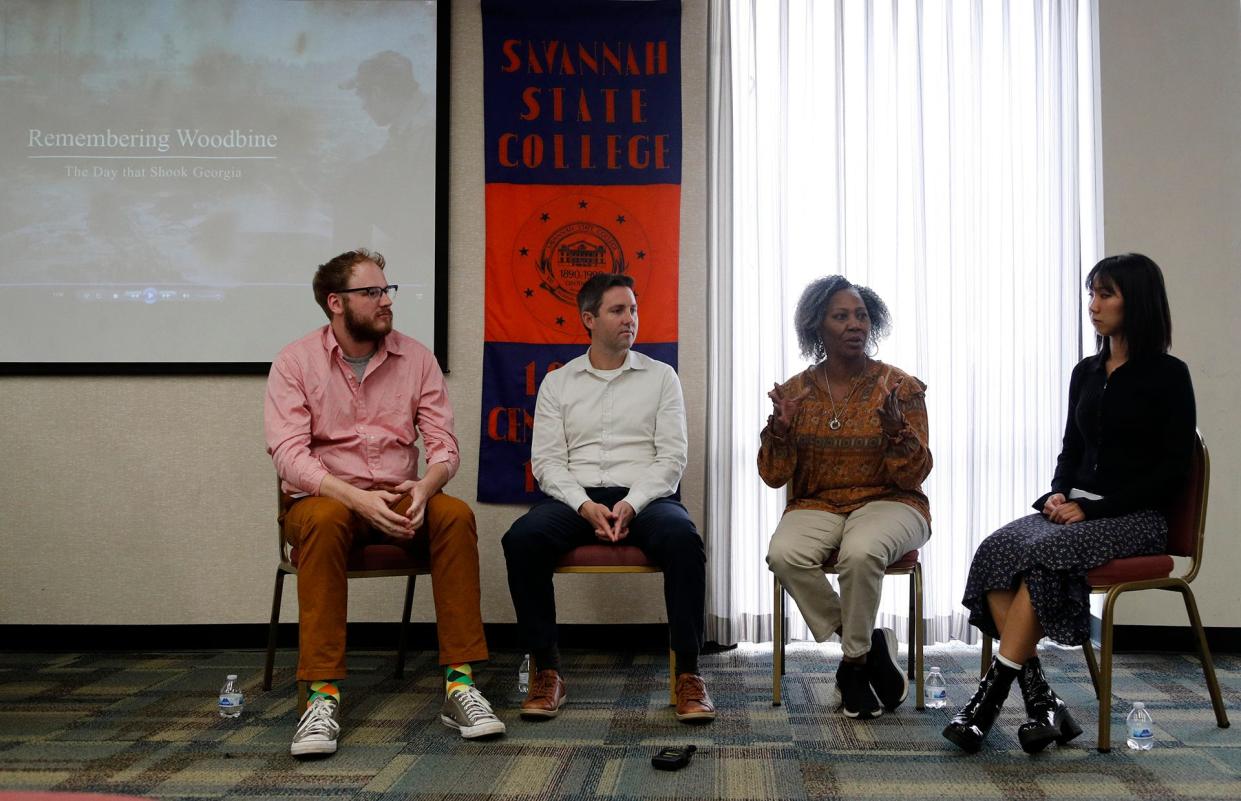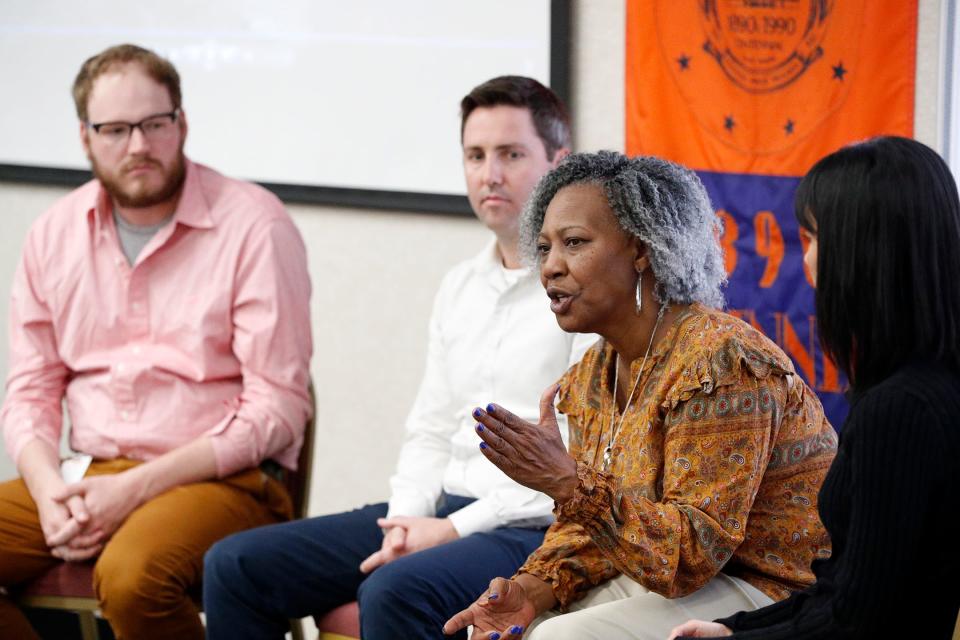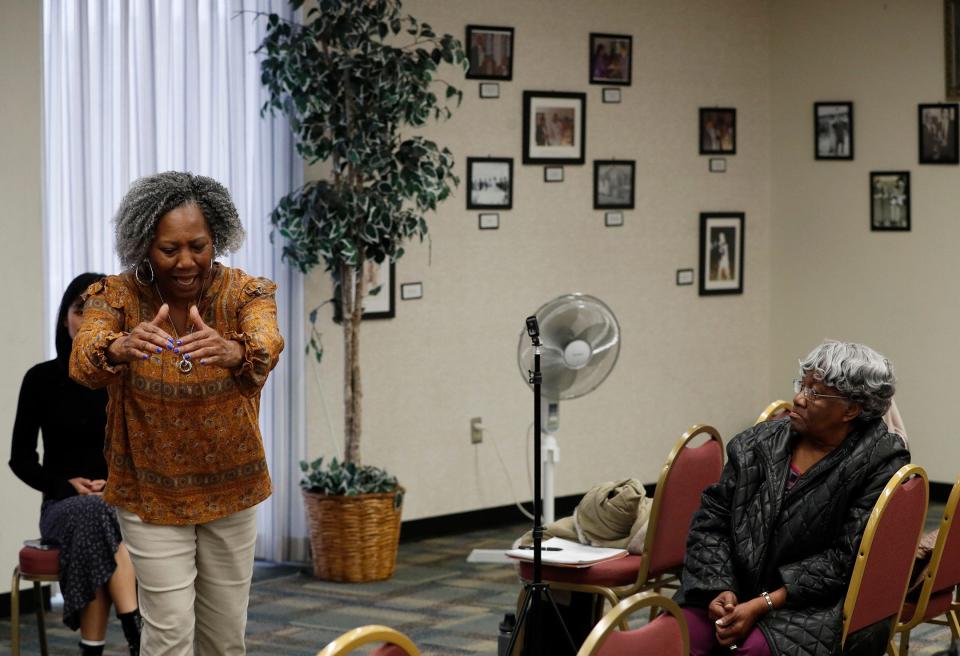'Give them their place in history': Savannah Morning News hosts panel on Thiokol projects

One of the deadliest industrial disasters in U.S. history took place in south Georgia in 1971, but the stories of the community and tragic explosion are still largely forgotten.
On March 29, the Savannah Morning News and Savannah State University partnered on a documentary screening and panel discussion about the 1971 explosion at the Thiokol Chemical plant in Woodbine, Georgia, that killed 29 people and injured more than 50 others. The speakers explored media projects working to bring attention to the history of the explosion.
Deep dive: In 1971, 29 people died in an explosion in Georgia. 52 years later, their story is being told
All episodes of Tripwire: Tripwire: Podcast investigates the 1971 Thiokol plant explosion in Georgia and what happened after
The panel discussed Tripwire, the seven-episode narrative, investigative podcast about the Thiokol explosion created by Savannah Morning News reporter Nancy Guan and editor Zach Dennis, as well as a short version of the feature-length film documentary filmmakers Patrick and Anne Longstreth has been working on. Dennis, Guan and Longstreth were joined by Jannie Everette, the president and CEO of the Thiokol Memorial Project and runs their museum in Kingsland.

50 years later, community strives to bring attention to Thiokol explosion
On Feb. 3, 1971, Woodbine was changed forever by an explosion at the Thiokol plant, a facility that employed and promised opportunity to local workers, predominantly Black women, during the Vietnam War. Workers were assembling trip flares illuminates for the war, which due to a U.S. government misclassification, the components exploded killing 29 and wounding 50 more.
For the next 17 years, survivors and family members of Thiokol's workers battled the federal government in court seeking justice. Despite the scale of the tragedy, survivors and their loved ones and descendants are still working to bring recognition to the Thiokol workers, both from the government and their own community.
Everette began the Thiokol Memorial Project back in 2013 when she realized how little the tragedy was being remembered.
She was babysitting the great-grandchildren of Ethel Banks, one of the women who died due to the explosion, who are also the great-grandchildren of her mother, who survived the explosion. The children had found an article online and asked Everette if there had been an explosion in Woodbine. When they said "Thiokol," it clicked for her.
"I looked at the story, and the second person on the list is their great-grandmother," Everette said. "They didn't know her. They didn't know she was killed in this explosion. No one had told them the story, it was not being taught in school." She said the Thiokol explosion only has two sentences devoted to it in Camden County's school history books.
Everette's work creating the memorial project was highlighted in an article from The Current on the 50th anniversary of the Thiokol explosion, which Longstreth read and was inspired to create the documentary with his wife and fellow documentarian Anne Longstreth.
Longstreth approached Dennis about creating a multimedia project on Thiokol. Dennis and Guan used interview audio from Longstreth's work, and also conducted additional interviews, research and site visits.
Tripwire Podcast, Episode 1 We Sang While We Worked
Tripwire Podcast, Episode 2: Woodbine, We Have a Problem

Telling difficult stories
"We feel very lucky to be able to tell this story in audio format and reach an even wider audience," Guan said. "I think the sound works to immerse people in the Thiokol story in visceral ways."
The panel discussed how to tell the stories of Thiokol tactfully and in a manner that balances the tragedy of the event while being respectful to those who were injured or killed. Guan said that the team took special care to strike that balance, particularly in the third and fourth episodes that focus heavily on the explosion and its aftermath. She said they worked to let the survivors tell their own stories, rather than narrate over the speakers.
"It's not about what you ask, it's how you ask," Everette said. Guan, Dennis and Longstreth agreed that Everette was the person who brought survivors, family members and other speakers to the conversation and helped facilitate the work. To tell these stories, building trust and rapport was integral.
According to Longstreth, some of the interviewees said it was the first time in 50 years that they had spoken on the subject and that it would also be their last. Moreover, Longstreth said several of the speakers have already passed away, and that the timeliness of this storytelling is more important than ever.

A place in history
"Those veterans, their lives had been saved by the men and women of Thiokol," Everette said.
The workers at Thiokol gave their lives to the war effort with little recognition. Not only have their sacrifices gone unrecognized by way of awards, historical recognition or governmental accountability, but the government has failed to deliver justice after a 17 legal battle in which it attempted to discredit survivors and families, calling them unskilled and illiterate, going so far as to claim that employees were at fault for killing their own coworkers.
"Give them their place in history," Everette said. Despite building the munitions used in the Vietnam War, the skilled workers of Thiokol have been largely left out of the histories of the war and labor.
The Thiokol Memorial Project spent about two years researching and considering an ultimate plan and decided that the organization's ultimate goal is to create a national monument.
National monuments are under the Department of Interior, which oversees all the country's national parks, monuments and wildlife refuges. The park would commemorate the 600 workers — 30 killed and 570 who survived — and the 16 cities, 14 hospitals and Army, Navy and Coast Guard which provided first responders. The project plans the park to be on the north end of Camden County along the interstate where it would not only draw in tourism but provide space for reflection and education.
The Thiokol Memorial Project has also created a petition to award the Congressional Gold Medal, Congress's highest honor of national appreciation, to the 30 people who died at the Thiokol explosion. Read and sign the petition at thiokolmemorial.org/petition.
Marisa Mecke is an environmental journalist. She can be reached at 912-328-4411 or mmecke@gannett.com.
This article originally appeared on Savannah Morning News: Savannah Morning News and Savannah State panel on Thiokol explosion

